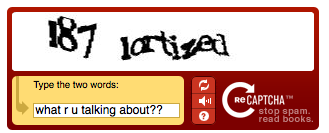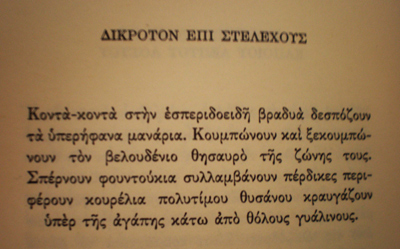Build, Break, Broadcast
Week 1
Thursday 07.10.2010
This space will be dedicated to the conceptual development of my thematic projects.
I d' rather use these pages as a form of sketchbook, sharing the process of thinking
from the very first stages to the final piece. In many cases this requires some
random writing and collection of found images which potentially will help me document
and shape the project.
So, starting from zero here are some rough ideas that could eventually shape the
core of the first or any of the following projects:
- Feedback (as in Audio, Optical or Textual Feedback)
- Memory - Location - Mapping.
- Mathematical Errors - the use of false statistics by governmental bodies or activists
to alter or amplify the result of statistical data (is it a form of hacking?)
- Broken Dialogues - Altering the speech - Linguistic games. Using Google translate as
a medium of broken language.
These are still very abstract ideas which may and up in the trash bin. But Hopefully
within the coming two weeks there will be more concrete points.
And some links of a couple of current shows (both in Belgium) that I find quite inspirational:
And the always inspiring Mathematical Errors website
Week 2
Sunday 17.10.2010
So. Things sometimes don't work as we wish. To put it that way: Major F*CK UPs happen.
This space is suposed to show creative thinking and the development of Build, Break,
Broadcast project but instead this week I will have to write about how computers break or die.
Basically, I managed to kill my MacbookPro last night. Which is pretty much the major tool and
most expensive piece of equipment I own. There are still chances that the poor machine will make
it through. Doctors say there are still a 20% chances...But instead of crying I d rather turn
this mishap into something positive...Accidents sometimes happen for good reasons...
Week 3
Thursday 21.10.2010
TYPOGRAPHER AND PROGRAMMER
I have always been fascinated by text and letterforms. So throughout the course I would like to
progress from a purely typographic interest to a more technical and programmatic use of type. Considering
the fact that a digital version of a typeface is basically a software, it is interesting to look at it
as a set of code that lets it execute. So for instance the letter "A" in helvetica is a group of ones
and zeros, behind the printed letter "A" which allow the computer to read and then print the requested letter.
Eventually in this course I would like to look closer to the programmatic structure of type design/ How can I
create a font by manipulating a programming language? What if the actual code behind the typeface becomes the
actual typeface? By looking at any computer code, eg. the source code of an html page, someone can say that
what we see in purelly visual terms is an abstract display of type.
CONCRETE POETRY. PERMUTATION POEMS
A good starting point for this change of direction (from seeing type as craft to treating it as code) could be
concrete poetry. The visual qualities of the text become more important than the actual meaning of the words.
Then permutation poems (which can be considered a form of concrete poetry) takes an other extreme and playful
use of words, in a more mechanical/mathematical way. Take a cut-up phrase from a random text.
This could be a randomly found text on a newspaper or a part from the Old Testament or any other text of - any
(in)significace. Then find all the possible combinations of these words and display each on a verse to build up
a poem. Biron Gysin used a lot this technique (with Burroughs in
some cases). There is an audio example in my first assignment for the prototyping class.
BUILD, BREAK, BROADCAST
So here is my idea for the first thematic project. I would like to take a live text source of online
information, ideally from a concervative media website (eg. the online version of a tabloid newspaper like THE
SUN). Then i would like to find a way that by just reading the main headline I would transform this string of
text into a poem - a permutation made after the pssible compinations of words. In that way a politically
negative message will be transformed to an absurd or poetic language. The outcome (poem) could either be some
text, printed on an external screen, or sound, a phonetic version of the printed text similar to the
aformenshioned audio example of i am that i am.
BUILD: the permutation poem created by the main headline of the newspaper BREAK: the cut up process BROADCAST: the final formation (sound or externally displaied text)
Friday 22.10.2010
Paul Hartal on concrete poetry and other useful topics and stuff
Concrete poetry involves the notion that language possesses aesthetic attributes. Visual poems employ typographical elements and printed words as a graphic medium. The creation of patterns and pictures out of letters and words may disclose, as Ian Hamilton Finley put it, “new decorative and semantic possibilities”. Concrete poets believe that by forming typographical units and words into particular shapes on a page adds greater meaning to the text and amplifies the statement. The visual design of the concrete poem embodies and extends the message beyond the meaning of its individual ingredients. The emerging piece evolves into a dual composition, both visual and literary. The whole becomes more than the sum total of its parts. (Paul Hartal)


